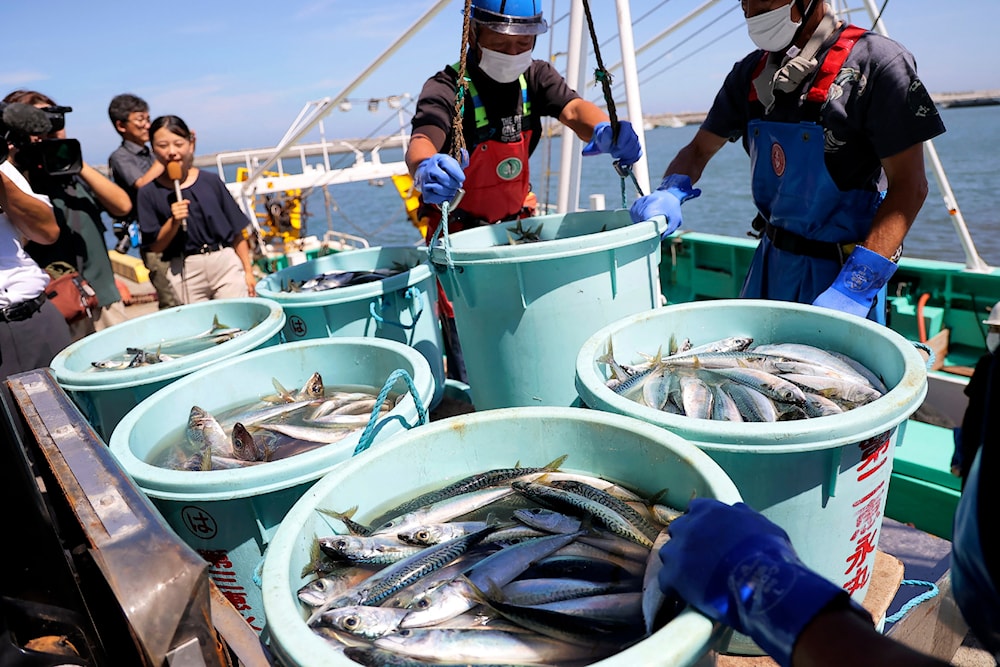China to 'gradually resume' Japan seafood imports after Fukushima ban
Beijing and Tokyo both emphasize that their agreement does not signal an immediate, full resumption of seafood imports from Japan.
-

This file photo taken on September 1, 2023, shows fishery workers unloading seafood caught in offshore trawl fishing at the port of Matsukawaura in the city of Soma, Fukushima prefecture, about a week after the country began discharging treated wastewater from the TEPCO Fukushima Daiichi nuclear power plant. (AFP)
China announced on Friday that it would "gradually resume" importing seafood from Japan, following a year-long ban in response to the release of treated water from the damaged Fukushima nuclear plant.
Japan began discharging treated water from Fukushima into the Pacific Ocean in August 2023, claiming that the process is safe, a view supported by the United Nations' atomic agency.
China, however, responded with strong opposition, labeling the move "selfish" and imposing a total ban on Japanese seafood imports.
On Friday, both Beijing and Tokyo confirmed they had reached a consensus regarding the wastewater release, allowing China to reinstate imports in phases.
"China will begin to adjust the relevant measures based on scientific evidence and gradually resume imports of Japanese aquatic products that meet the regulation requirements and standards," the Chinese Foreign Ministry confirmed in a statement.
It indicated that officials from both nations had engaged in "multiple rounds of consultations" concerning the Fukushima water release.
It said Japan had committed to "fulfilling its obligations under international law, doing its utmost to avoid leaving (a) negative impact on human health and the environment, and conducting continuous evaluations of the impact on the marine environment and marine ecosystems."
On his part, Japanese Prime Minister Fumio Kishida mentioned that Tokyo had informed Beijing of "its readiness to carry out additional monitoring of the... treated water, while the Chinese side has decided to... steadily restore imports of Japanese fishery products that meet certain standards."
The International Atomic Energy Agency (IAEA) also stated that it would "coordinate with Japan and other stakeholders, including China, to ensure that the additional measures are implemented appropriately... to ensure that water discharge levels are, and will continue to be, in strict compliance and consistent with international safety standards."
In 2011, the Fukushima-Daiichi nuclear plant in northeastern Japan witnessed a meltdown of three reactors following a huge earthquake and tsunami that claimed around 18,000 lives. Since then, plant operator TEPCO has been collecting contaminated water from cooling operations, as well as groundwater and rainwater infiltration.
Following China’s seafood ban, Russia also imposed similar restrictions in October as a "precautionary measure". On Wednesday, the Russian news agency TASS reported, citing a senior sanitary official, that Moscow plans to maintain the ban.
However, both China and Japan emphasized that their agreement has its limits. Mao Ning, a spokesperson for China’s Foreign Ministry, reiterated her country’s firm opposition to Japan’s "arbitrary discharge into the sea," clarifying that this consensus does not signal an immediate, full resumption of seafood imports from Japan.
Kishida also stressed that Japan's stance on the matter remained unchanged, emphasizing that the restrictions should be lifted entirely and that the recent announcement would serve as a step toward that goal.
Masanobu Sakamoto, head of Japan’s national fisheries group, viewed the agreement as "only the first step" toward fully restoring seafood exports.
"The Japanese government should remain fully aware of the plight of fishermen across the country who are affected by the total import suspension measures and continue to make every effort to lift the suspension as soon as possible," he underscored.
China and Japan are key trading partners, with the first importing more than $500 million worth of Japanese seafood in 2022, according to customs data. However, the wastewater release remains a contentious issue, exacerbated by existing trade disputes and territorial tensions.
Additionally, tensions flared earlier this month when a Chinese aircraft carrier sailed between two Japanese islands near Taiwan for the first time, prompting Tokyo to label the action "totally unacceptable from the perspective of the security environment of Japan and the region."
Read more: 25-tonne radioactive water leak in Japan's Fukushima-1 confirmed

 4 Min Read
4 Min Read








